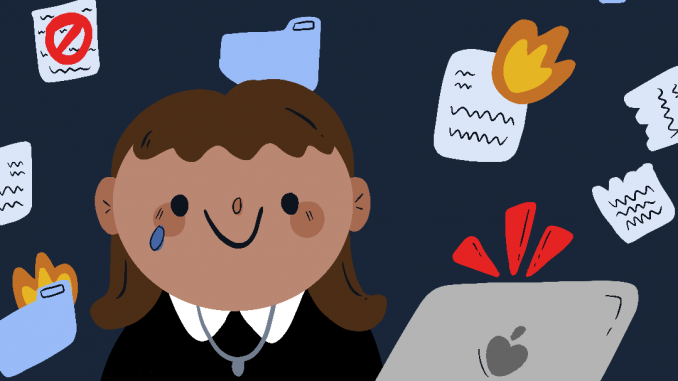
Professionalism is elitist and gratuitous, especially during a pandemic.
Professionalism varies depending on the workplace, but it is generally defined as an individual’s conduct and appearance at work. This includes arriving on time, being respectful and dressing appropriately, the Balance Careers reported.
While no one is objecting to the fact that being punctual and honest are positive traits, professionalism often has classist, ableist and gendered implications, like emphasizing expensive clothing and polite mannerisms. Censoring the way a person expresses themselves perpetuates a hierarchy and suppresses individuality, especially amid the COVID-19 pandemic, as many students are working from home in their bedrooms.
Madison Buffardi, a 2019 strategic communication alum, has always been told to cover up their tattoos or take out their piercings at job interviews, they said.
“As a queer nonbinary person, when I am not presenting in traditionally feminine ways, there have been times when people have made it clear that they do not like that part of who I am, nor respect it,” Buffardi said.
As the COVID-19 pandemic has forced us to pivot to remote work, employers are trying to bring the office home too.
A Wall Street Journal article from July 2020 titled “Seven Rules of Zoom Meeting Etiquette From the Pros” prohibited “rookie moves,” including poor Internet connection, loungewear, eating, pets and family members in the background, or “lurkers.”
But we’re not in a conference room. We’re in a pandemic. And we’re students.
In the era of online school, some professors are placing pre-pandemic expectations on students, adding unnecessary stress during an unprecedented time, Buffardi said.
“I’ve had professors scold me for having my pets in view during class, eating during a three-and-a-half-hour class and wearing hoodies or loungewear during class,” they added. “If you are able to show up, do the work and do well during a global pandemic, that should be all that matters.”
Professors should be developing trust and rapport with their students. Karen Turner, a journalism professor and faculty member on Klein Rising, pointed out one of her student’s lovely backgrounds.
“I kept complimenting her on it. If it’s appropriate, you can certainly express some of your personality,” Turner said.
Many students do not have a quiet office space or high-speed internet connection for interviews, nor can they afford business casual clothing deemed as the only acceptable attire by employers.
About 4.4 million households in the United States do not have consistent access to a computer, and 3.7 million households lack internet access, according to a 2020 Household Pulse Survey conducted by the U.S. Census Bureau.
If schools and workplaces require high-speed internet, it shouldn’t become the burden of the students, said Julia Rivera, a 2018 international business and Spanish alumna.
“It just doesn’t cross [employers’ and professors’] minds how privileged they are to never have to think about having internet access,” Rivera said.
We should be focused on defeating COVID-19, not scrutinizing someone for eating a snack or wearing pajamas in the comfort of their own home. We’re humans, not robots.
Students can succeed in their classes and internships and still prioritize their mental health and identity, Buffardi said.
“There is a lot of ableism, classism and binaries that take hold when people try to create expectations for professionalism,” they added. “That is something we all need to unpack. I think COVID-19 has only made it more clear to me that there are a myriad of things that get overlooked in the name of ‘good work ethic.’”



Be the first to comment